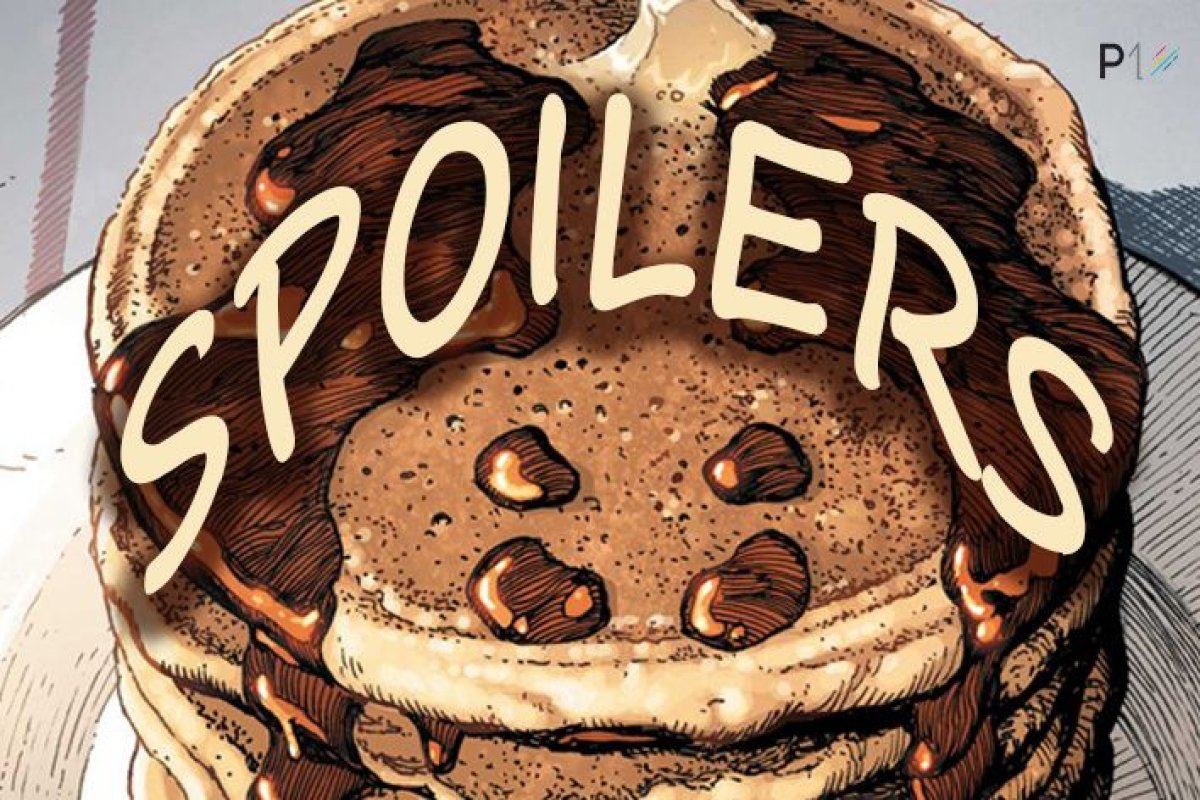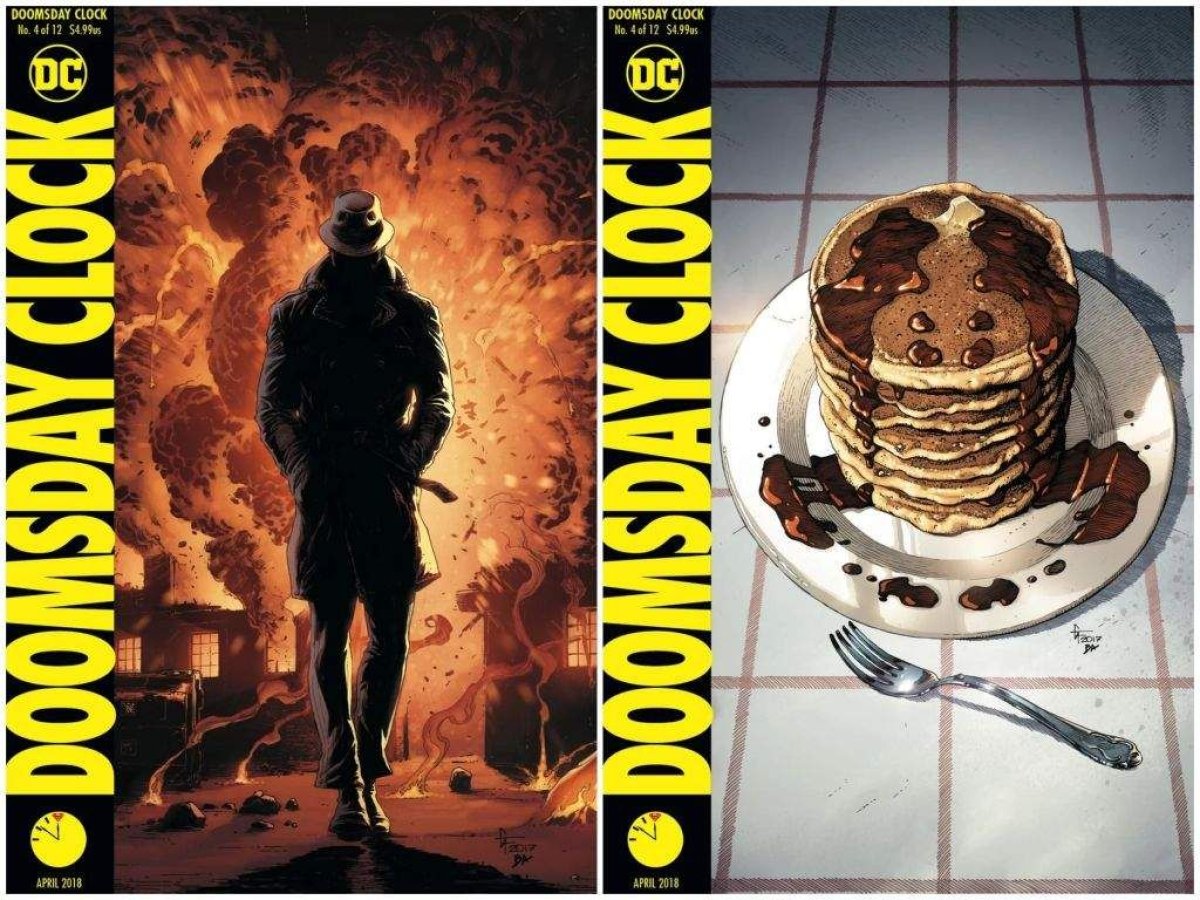Rorschach's partnership with Adrian Veidt (Ozymandias) was off-putting from the beginning, which says a lot given the rest of the events in Doomsday Clock. The Comedian is back, two new characters we know nothing about are roaming around Gotham, Batman is trippin' and Doctor Manhattan has somehow stolen a decade of time. While Doomsday Clock #4 does little to advance the story on paper, the issue makes me feel more comfortable entering this brand new world. Rorschach 2.0 may be an unreliable narrator, but we can trust him to help us navigate the tough existential questions and subconscious battles that come with a Watchmen-inspired story from Geoff Johns and Gary Frank.
Spoiler warning: If you have not read Doomsday Clock #4, there is no better time to turn back.

There's a moment in Doomsday Clock #4 where the series becomes a carefully plotted Watchmen sequel. It's when Reggie screams as his Dad's mug, the only item he has left from his father, crashes onto the floor of the Fitzgerald Mental Home. But while issue 4 certainly proved the story is on course to follow in the footsteps of Watchmen, the lasting impact of the issue shows why its own story.
If you didn't already guess from the Dad mug, the new Rorschach is the son of Kovacs' prison psychiatrist Dr. Malcolm Long. Doomsday Clock #4 spends nearly the entire issue flashing back through Reggie's life after the death of his parents during Veidt's deadly massacre. Once just a college kid driving back to New York and now a man whose life changed in one instant--left with post traumatic stress disorder and the insurmountable task of trying to figure out how to proceed in a world that offers little to no hope.
Not at all unlike the one many of us are living in now. Beyond the obvious political parallel though, Johns takes things down to the micro level. Dr. Long saw a pathway, saw a way to place himself in a position to affect change. Reggie, not so much. Dealing with delusions and hallucinations exacerbated by the traumatic death of his parents, Reggie is forced to sort through his thoughts and determine if his perception of reality is one he can survive in. By the end of the issue, he sees what he wants to see: hope, in the form of Rorschach.
The most profound moment in this issue is in its last few pages. The overlying question presented is one I ask myself all the time. Can good people do bad things? Can bad people still have good in them? Is it as black and white as we convince ourselves so that we can feel better about our own moral code? And who gets to define the two? Even though the man standing before him killed his parents and thousands of other people, Rorschach sees the humanity in Veidt. The moment Rorschach lowered the knife from Veidt's throat, I sighed with relief in unison with Reggie. The energy it takes to hate, to get revenge isn't the same energy that allows you to heal and move forward. This display of emotional intelligence represents the personal evolution it takes to achieve true enlightenment.
While Reggie "Never saw self as fighter," that's the very reason he's a man suited for vigilantism. The internal struggle of being what you want to see--in this case, knowing you'd be great at something you know you don't want to be. Veidt's very strengths are his weaknesses-- drawn to power, control and influence, he falls to his own ego. He wanted to be the one to save the world and because of it, failed to see the bigger picture and real "light." Reggie doesn't want to, but it's his only option. Veidt tells Reggie with a knife to his throat, "Make the world cheer in celebration, 'Rorschach.'" But Reggie is reluctant to succumb to redemption. Our world needs more reluctance. We need cops who don't want to use guns. We need politicians who don't want to be in charge.
The idea of Rorschach is all Reggie has left of his father, and he takes that ounce of goodness Long saw in Rorschach and holds onto it for the sake of his own sanity and ability to persevere in a world that appears destined for destruction. And that's almost why Rorschach is able to hesitate killing Veidt at the end. Killing him won't help, and there's not really anything to lose by letting him live. Johns is at his best in this headspace, exploring the intricacies of Rorschach's sanity. In seeing what you want to see, we're presented with a fine line between insanity and the survivor mentality it takes to persistently propel ourselves deeper and deeper into a world unknown.

Uncommon Knowledge
Newsweek is committed to challenging conventional wisdom and finding connections in the search for common ground.
Newsweek is committed to challenging conventional wisdom and finding connections in the search for common ground.
About the writer
Autumn Noel Kelly started as a staff writer for Newsweek in 2015. She covers anything in the comic book world—TV ... Read more
To read how Newsweek uses AI as a newsroom tool, Click here.






